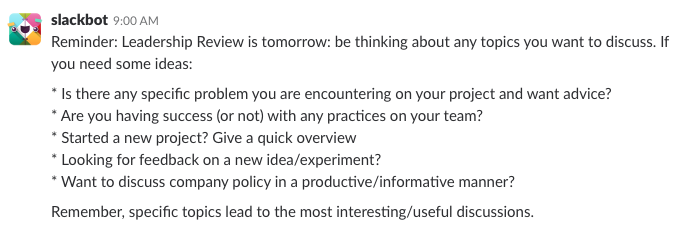This committee is a pointless time suck
Series: practices September 19, 2018
I’ve been on a dozen committees (or “company initiatives” or “recurring discussions” or “organizational development groups”) and their value has varied wildly.
In the past year, I’ve taken charge of one of the committees with the goal of making it run more effectively.
Here are some things I’ve been doing to keep my committees from becoming pointless time sucks.
Create a charter
The biggest problem with committees is that they have no purpose. Not that they are pointless, but rather, the group does not clearly state why they formed and what they are trying to achieve.
Spend time upfront figuring out what you are trying to do and then put it in writing to confirm everyone is actually on the same page.
If you can’t come up with a purpose statement and some guiding principles, you aren’t ready to have a committee.
A charter is something to point back when you need to make a decision. Apply a test for any new ideas: does this align with the purpose of this group? Filter out things that don’t further the mission.
As an example, here is an excerpt from our Professional Development (PD) charter:
The guiding principles that influence our PD system are:
* Minimizing friction to doing PD activities
* Minimizing friction to recording and sharing PD activities
* Setting the expectation that everyone does PD relevant to their current (or future) role
When trying to decide what activities the PD committee should support or create, they have to link to at least one of the principles. When we evaluate if something was a success, we judge it based on if it furthered the goals of the group, regardless of how fun or cool or exciting it was.
No agenda? No meeting.
Open-ended, recurring meetings are a great way to feel like you are getting things done. Everyone can walk in and chat about ideas and brainstorm, but it’s a trap.
Without an agenda, these meetings will never force a decision to be made. Especially when the people involved have other things on their plates, it’s easy to fall into a pattern of circling around the same topics for weeks.
The other problem with open-ended meetings is when everyone gets in the room and realizes there is nothing to talk about. The sunk cost fallacy sets in and “since we’ve already got the time blocked off”, we might as well just chat…
I’ve tried a few things to combat this and the one that worked best was a Slack reminder. The bot posts it a day before the meeting and if no one has any updates or items to discuss, we cancel the meeting.
 An “are we meeting and what are we talking about?” reminder for a recurring twice-a-month meeting
An “are we meeting and what are we talking about?” reminder for a recurring twice-a-month meeting
 A “please come prepared or it will be a waste of everyone’s time” reminder
A “please come prepared or it will be a waste of everyone’s time” reminder
Build a road map
Fatigue is a challenge for committees. You can run a meeting on energy and enthusiasm for several months. But without being intentional and scoping new efforts, the excitement will fade and the group will slowly slide to a halt.
Something I’ve been trying recently and having success with is doing a formal quarterly road map. At the start of each quarter, we meet with the full group (scheduled off the regular cadence if necessary) to do three main items:
- Evaluate what activities we’re currently doing: are they effective? are they making an impact? are they still aligned to the charter?
- Elevator pitches for new ideas or things to explore
- Commit to which activities we are going to keep doing, which we are going to try for the quarter, and assign an “owner”
For our group, the “owner” of an item was the one accountable for making sure it happened during the quarter, but not the sole responsible party. Everyone in the group is happy to help out, but having a designated person in charge makes sure it gets done.
These road maps are formal in the sense that we wrote it down, but still pretty lightweight (no metrics/OKRs/etc). Here is a road map from a past quarter:
Q2 Road Map:
* Keep doing current activities
** Quarterly PD sharing / PD site
** Processing reimbursement (ad-hoc)
** Upkeep on Commons display
** 2-week committee meetings
* Wrap up small items
** Retire #pd slack channel - MDS
** Write April newsletter - MCT
** Write May newsletter - TET
** Evaluate LMS - MCT
* New efforts
** Celebration Event - JCF
** Spring Cleaning 30 Day Challenge - MDS
** Uncover good PD stories - CRK
Cycle members
Some committees have a fixed lifespan – they form, do something, and then go away. Others are intended to be longer-term and continually support some activity or system.
For long-term groups, provide an “on/off ramp” for members. The group should ideally be cycling folks in and out over time to get a mix of different opinions and allow people to take a break or wind down as their own interests and availability wane.
Making it out okay for people to take a break helps prevent burnout and people sticking around because they still want to support the effort or feel obligated to see it through till the end, even if they have lost their own excitement about the mission.
With a clear charter, it should be easier to change the group composition without losing alignment to the purpose.
